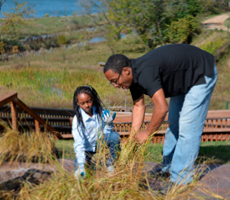- August 29, 2017
- By Karen Shih ’09
These days, conservation can feel like a losing battle. Headlines bombard us with stories about the impending death of the Great Barrier Reef, global glacier retreat and the next great extinction.
But Curtis Bennett ’10 is an optimist. The director of conservation community engagement for the National Aquarium in Baltimore believes that every person can make a difference for the environment–they just need to know how.
“We’re changing perspectives and mindsets,” he says. “We connect the environment to issues like public health, and relate how air and water quality affect people’s everyday lives.”
Baltimore hardly seems like the epicenter of environmental preservation. It’s a city better known for its seafood and crime problems. But nature is everywhere, even in the cracks of a city sidewalk, so Bennett’s out in the community daily to show people what they can do.
Church members and community residents might plant pollinator gardens, for example, and excitedly text Bennett when the first flower blooms and the first bees and butterflies arrive. A group of students might paint storm drains with pictures of fish, showcasing their creativity and offering a reminder about the dangers of pollution. Families might gather at Masonville Cove Urban Wildlife Refuge for a chance to “get nerdy with nature” and become citizen scientists, counting the vast diversity of wildlife that flourishes even in an urban area.
“We’re so lucky to have Curtis,” says Hillary Clayton, an environmental science and biology teacher at Benjamin Franklin High School. “He has so many good ideas. He’s so friendly and down to earth. The kids love him.”
Bennett worked with her students on a yearlong project to create a rain garden at their school, from obtaining a grant from the Environmental Protection Agency to constructing a fence to the actual planting.
“The experience is so transformational, especially in an urban space where our kids don’t feel connected with nature,” Clayton says. “The most empowering thing in science is connecting the student to the curriculum, letting them know it’s part of their life and letting them see their impact.”
Bennett has always loved nature. As a kid growing up in Bowie, Md., he watched the deer, wild turkeys and even snakes that came through his wooded back yard. His parents enrolled him in nature camps and took him camping, where he’d listen to the hoots of owls and buzz of cicadas high above him in his tent.
It felt only natural for him to enroll at the University of Maryland as an animal science major. But an internship after his freshman year made him realize that being a veterinarian wasn’t his calling. He wanted to focus on wildlife, not pets.
After speaking to his adviser, Professor Mark Varner, he turned to the environmental science and policy program, which at the time had just launched a new concentration in wildlife ecology and management. Bennett knew that he’d found his path.
“It was just a great opportunity to have hands-on learning experiences,” says Bennett, who also worked on diamondback terrapin conservation as part of his Honors College Gemstone program research. “I can remember taking a wetland ecology class, and almost every week we were in boots, up to our knees and waist in mud.”
He pursued a master’s degree at the University of Delaware in wildlife ecology, studying river otters in New Jersey. When he graduated in 2014, he joined the National Aquarium as a conservation project manager, which combined his interests of working directly with wildlife, including habitat restoration, and working with the community.
Outreach has become almost second nature to him. Since he was old enough to volunteer at camps and nature centers for the Maryland-National Capital Park and Planning Commission (M-NCPPC), he’s been educating younger generations about the importance of conservation. He worked for M-NCPPC part-time throughout his years at UMD, then joined the Delaware Nature Society as a naturalist during grad school.
As a result of Bennett’s years of hard work and dedication to conservation, he was promoted in January to director from project manager, which gives him a chance to develop new community programs and partnerships. He’s also using his visible role as a leader of color in the field to mentor a diverse group of students who hope to seek careers in conservation.
Even when he’s not working on one of his own projects, he takes advantage of all the aquarium’s unique opportunities, including a trip to band and track baby pelicans in late July. “It’s more than a job—it’s a passion.”
